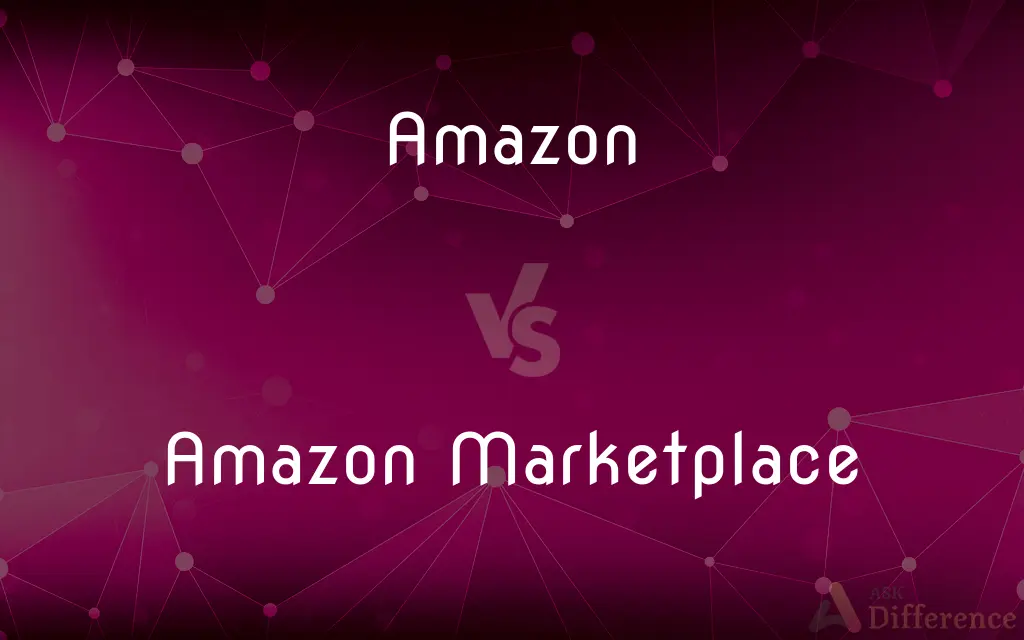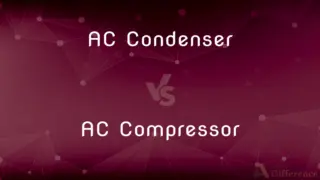Amazon vs. Amazon Marketplace — What's the Difference?
By Maham Liaqat & Fiza Rafique — Published on March 9, 2024
Amazon is global e-commerce giant offering a wide range of products directly or through third-party sellers. Amazon Marketplace is a platform within Amazon where independent sellers can offer product to Amazon's customer base, with Amazon's own offerings.

Difference Between Amazon and Amazon Marketplace
Table of Contents
ADVERTISEMENT
Key Differences
Amazon, as a comprehensive e-commerce platform, sells products directly to consumers, sourced from manufacturers and wholesalers, acting as a traditional retailer. This includes a vast array of items from electronics to household goods, often under the banner of "Ships from and sold by Amazon.com."
Amazon Marketplace, on the other hand, serves as a segment of the larger Amazon platform, allowing third-party sellers, ranging from small-scale businesses to larger retailers, to list their products for sale. These listings appear alongside Amazon's own inventory, providing customers with a broader selection of goods.
The main distinction between Amazon and Amazon Marketplace lies in the seller-customer relationship. When purchasing from Amazon directly, the transaction, shipping, and customer service are solely handled by Amazon. In contrast, transactions made on the Amazon Marketplace involve a third-party seller, where Amazon acts more as an intermediary, facilitating the platform for the transaction and, in many cases, handling logistics through services like Fulfillment by Amazon (FBA).
Both Amazon and Amazon Marketplace utilize Amazon's customer service infrastructure, but the responsibility for product quality, shipping speed, and customer satisfaction can vary. For items sold through Amazon Marketplace, third-party sellers are responsible for their inventory and adherence to Amazon's policies, although Amazon provides customer service and processes returns for orders fulfilled by FBA.
The pricing strategies also differ. Amazon directly controls the prices of the products it sells, often leveraging its scale to offer competitive pricing. Marketplace sellers set their own prices, which can lead to greater price variability and competition among sellers on the same platform. This competition can benefit consumers through potentially lower prices and a wider variety of product options.
ADVERTISEMENT
Amazon's review system is another area where the distinction is apparent. Products sold directly by Amazon typically accumulate reviews for the product itself, while Marketplace items can receive seller-specific feedback in addition to product reviews. This dual feedback system helps customers make informed decisions based on both product quality and seller reliability.
Comparison Chart
Seller
Amazon itself
Independent third-party sellers
Product Range
Directly sourced by Amazon
Extended range from various sellers
Pricing
Controlled by Amazon
Set by individual sellers
Customer Service
Provided by Amazon for its products
Provided by Amazon and sellers, varies by fulfillment method
Shipping
Handled by Amazon
Can be handled by Amazon (FBA) or sellers directly
Returns and Refunds
Directly through Amazon
Processed by Amazon, but seller-specific policies may apply
Reviews
Product-centric
Product and seller feedback system
Responsibility for Compliance
Amazon's inventory standards
Sellers must adhere to Amazon’s marketplace policies
Compare with Definitions
Amazon
An e-commerce retailer selling a wide variety of products directly.
I bought a laptop directly from Amazon.
Amazon Marketplace
Offers a broader range of products through independent sellers.
I found a vintage record player on Amazon Marketplace.
Amazon
Manages customer service for products it sells.
Amazon handled the return of the damaged book I bought.
Amazon Marketplace
Includes seller ratings and feedback.
The seller on Amazon Marketplace had excellent reviews.
Amazon
Offers Prime membership for benefits on direct purchases.
She used her Prime account for free two-day shipping from Amazon.
Amazon Marketplace
Sellers can choose to use Amazon's fulfillment services.
She ships her products through Fulfillment by Amazon.
Amazon
Utilizes vast warehouses for its inventory.
Amazon's fulfillment centers stock millions of products for quick shipping.
Amazon Marketplace
A platform for third-party sellers to list products on Amazon.
He sells handmade jewelry on Amazon Marketplace.
Amazon
Sets competitive prices for its goods.
Amazon had the best price for the headphones I wanted.
Amazon Marketplace
Prices can vary widely between sellers.
Different sellers on Amazon Marketplace had varied prices for the same book.
Common Curiosities
What is Amazon Marketplace?
Amazon Marketplace is a platform within Amazon where independent third-party sellers can list and sell their products.
Can anyone sell on Amazon Marketplace?
Yes, businesses and individuals can sell on Amazon Marketplace, subject to Amazon's policies and fees.
Does Amazon handle shipping for all Marketplace orders?
Not always. Sellers can fulfill orders themselves or use Amazon's Fulfillment by Amazon (FBA) service.
Can Marketplace sellers offer products in all of Amazon's categories?
Sellers can list products in most categories, but some require Amazon's approval to maintain product quality and safety standards.
How do I know if I'm buying from Amazon or a Marketplace seller?
The product listing will indicate if the item is "Ships from and sold by Amazon.com" or if it's sold by a third-party seller.
Are products from Amazon Marketplace reliable?
Product reliability can vary, but Amazon provides customer reviews and seller ratings to help buyers make informed decisions.
Is there a difference in shipping speed between Amazon and Marketplace items?
Shipping speeds can vary, but items fulfilled by Amazon, including many Marketplace items, may offer faster shipping options.
Can I return a Marketplace item to Amazon?
Yes, especially if fulfilled by FBA. Return policies may vary for items shipped directly by sellers.
How does Amazon ensure Marketplace sellers adhere to its policies?
Amazon monitors seller performance, customer feedback, and adherence to its policies, taking action against sellers who violate terms.
How does Amazon Marketplace benefit consumers?
It provides a wider selection of products, competitive pricing, and the convenience of shopping from various sellers on a single platform.
Share Your Discovery

Previous Comparison
AC Condenser vs. AC Compressor
Next Comparison
Shepherd’s Pie vs. Cottage PieAuthor Spotlight
Written by
Maham LiaqatCo-written by
Fiza RafiqueFiza Rafique is a skilled content writer at AskDifference.com, where she meticulously refines and enhances written pieces. Drawing from her vast editorial expertise, Fiza ensures clarity, accuracy, and precision in every article. Passionate about language, she continually seeks to elevate the quality of content for readers worldwide.
















































